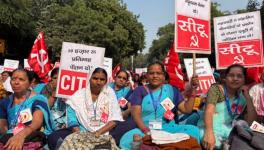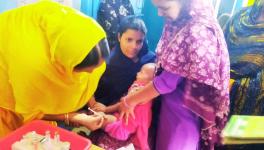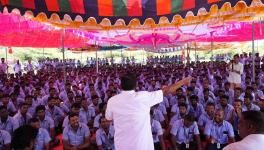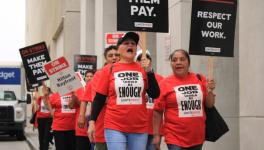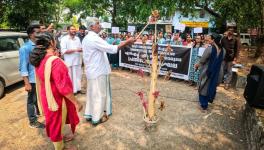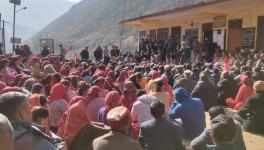What Pushed Scheme Workers to Call for 2nd Strike Since Pandemic Hit Country?
Representational use only.
The national joint platform of workers engaged under numerous government-sponsored schemes – ranging from ensuring health to rural households to providing meals to school children – has called for a countrywide one-day strike on September 24.
The striking workers will include ASHAs (Accredited Social Health Activists), along with Aanganwadi, Mid-day Meal, National Health Mission workers, among others, according to a strike notice dated September 14 by the Joint Platform of Scheme Workers Federations. The notice is addressed to the Secretary of Union Ministry of Labour and Employment.
Signed by the 10 Central Trade Unions, the notice carries 17 demands that include above all the regularisation of these workers as per the recommendations of 45th and 46th Indian Labour Conference and further notifying those “deputed in covid duty” as frontline workers. The unions are also demanding a monthly payment of Rs. 21,000 along with provision for ESI and PF for all the scheme workers.
ASHAs, attached to the country’s National Rural Health Mission (NRHM), and Aanganwadi workers, under the Umbrella Integrated Child Development Services (ICDS) scheme, are all women workforce. Further, nine out of ten of every mid-day meal worker belongs to the female gender. Other government schemes include both male and female working force.
Collectively known as scheme workers, these workers have remained deprived of the status of a ‘worker’ for years. They thus have found themselves bereft of the benefits of a government worker despite being engaged in the State’s schemes. Instead, they are treated as being on an ‘honorary’ position and paid in terms of an ‘honorarium’ instead of ‘wages’.
The workers rue that their long-pending demand for getting their labour recognised remains unmet even though all the sections of the scheme workers in the country, since last year, have been at the forefront in assisting the local health departments to restrict the spread of the Covid-19 disease.
This was what Surekha from All India Coordination Committee of ASHA Workers (AICCAW) told Newsclick on Thursday. Speaking from Haryana over the phone, she said, “There are over one lakh scheme workers here in Haryana, and almost all of them are women. For years, they have been demanding to be recognised, but nothing has changed.”
She added that preparations are “in full swing” in Haryana for the upcoming strike. “Yes, it is disappointing to note that the government refuses to budge even while we are assisting in battling the pandemic. The union, on the other hand, won’t stop fighting for the rights of the scheme workers,” said Surekha of the Centre of Indian Trade Unions (CITU)-affiliated ASHA workers’ body.
To be sure, this will be the second time – in addition to multiple protests across the country – that the scheme workers will be abstaining from their duties nationwide. A similar two-day strike was staged last year, which had brought similar issues to the fore.
“When the country was hit with the pandemic, the ASHAs went from home-to-home in rural areas to spread awareness and distribute medicines; the Aanganwadis carried out multiple surveys. Even now, both are engaged in carrying out additional duties pertaining to the Covid-19 vaccination drives,” Rama, national president of Scheme Workers Federation of India (SWFI), said from Karnataka, implying that the workload of the scheme workers had increased manifold since the pandemic.
The increase in workload is not accompanied by any significant increase in the incomes of the ASHAs in the state, Rama lamented.
To bring the attention of the governments to such a “deplorable” condition, she added that many campaigns and protests were staged during the pandemic period. Even then, there is very “little support from the government’s end”, Rama of the All India United Trade Union Centre (AIUTUC)-affiliated federation added.
For example, according to her, benefits of the insurance scheme in case of death due to Covid-19 hasn’t yet “reached every ASHA who died because of the [corona]virus”, in Karnataka. Rama was alluding to the insurance scheme, introduced last year for all the healthcare workers under the Pradhan Mantri Garib Kalyan Package, which provides Rs life insurance cover. 50 lakh in case of death due to Covid-19.
With ASHAs under the fold of it, this insurance scheme was reintroduced again this year for six months after the resurgence in Covid-19 infection rates.
Among other demands, the Joint Platform of Scheme Workers is also pressing to strengthen the public health infrastructure by demanding 6% of GDP for the health sector and demanding the enactment of legislation for the right to universal healthcare.
Apart from these, the joint platform also flays the proposals of “privatisation of basic services”, while demanding the Narendra Modi government to make the Centrally Sponsored Schemes permanent with adequate budget allocation. “Tax the super rich,” for mobilising finance, the scheme workers’ body said in their notice.
Meanwhile, raising local issues, demonstrations have also been staged by scheme workers in the recent past in various states, including in Uttar Pradesh, Madhya Pradesh, Maharashtra, Andhra Pradesh, and Jammu Kashmir. They too are expected to be raised during the upcoming one-day strike.
Furthermore, in other states, there are ongoing struggles too. For example, in Punjab, the protest of the aanganwadi workers outside the Sangrur residence of state’s education minister Vijay Inder Singla has entered its sixth month. The protesting workers are opposing the enrolment of pre-primary students in government schools, saying that this will put their jobs “under threat”.
Pre-school non formal education to the children between the age of three to six years comes under the objectives of the Aanganwadi services, since it was launched in 1975. Punjab reportedly became the first state in 2017 to shift the pre-primary classes in all its government primary schools.
Pratibha Sharma, an aanganwadi worker associated with All Punjab Aanganwadi Workers’ Union (APAWU) who had just returned to her home in Bathinda after “giving duties at the protest site [outside Singla’s residence]”, told Newsclick on Thursday that the workers would also take part in the upcoming one-day strike if their state union gives the call for the same. “It is a matter of our jobs; we will fight till the end in every way possible,” she said.
Similarly, in Uttarakhand, the ASHAs, who have been boycotting their work since over a month now to demand an increment in their honorariums, will also take out rallies across the state on September 24, said Shiva Dubey, state president of Uttarakhand ASHA Workers’ Association said. “There are 13,000 ASHAs in the state and all will be taking part in the programme on the strike day,” she said.
Get the latest reports & analysis with people's perspective on Protests, movements & deep analytical videos, discussions of the current affairs in your Telegram app. Subscribe to NewsClick's Telegram channel & get Real-Time updates on stories, as they get published on our website.












